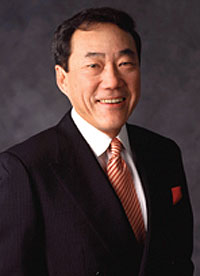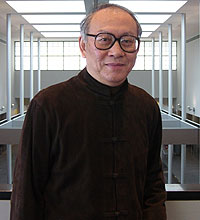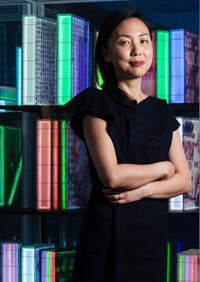People
Charles B. Wang
Founder

Charles B. Wang was the Founder and Chair Emeritus of Computer Associates, co-owner of New York Islanders, and philanthropist. Coming to America from Shanghai as a child of eight, Charles Wang proved a keen athlete, star student, and an outstanding businessman whose software company, Computer Associates International Inc., became a world leader. Wang embodied the American dream, but he also steeped in an older heritage: "As a Chinese-American I cherish the land of my birth," he said, "and I cherish the land that gave me a home. I am indeed doubly blessed. It’s a long way from Shanghai to Stony Brook, but thanks to technology, the world is shrinking every day, and that’s a very good thing for us. As we all get to know one another, as we get to interact with different cultures and different countries, the walls that divide us begin to crumble."
Wang founded Computer Associates International, Inc. with three associates in 1976. Born in Shanghai, China, in 1944, he moved to the United States with his family in 1952. He earned a BS degree in mathematics from Queen’s College and began his computer career at Columbia University’s Riverside Research Institute as a programming trainee. He was the author of Techno Vision II: Every Executive’s Guide to Understanding and Mastering Technology and the Internet, which educates decision-makers about the e-Business Revolution. He served on several corporate boards and had been active in charitable causes such as the Smile Train, the Make a Wish Foundation, and the National Center for Missing and Exploited Children. He passionately believed that he should share the benefits of his unique experience and success. As a beneficiary of public education, Wang chose to endow Stony Brook University to reach those young people, many of them also immigrants, who will use the gift as a gateway to success. On October 21, 2018, Mr. Wang passed away in his home in Oyster Bay. His memory and contributions will long be remembered by the members of the University, and the large network of people whose lives have been changed through his presence.
P.H. Tuan
Architect
 Wang Center designer P.H. Tuan was born in Shanghai, China, where he completed his
secondary school education. After a brief stay in Hong Kong, he immigrated to America
in 1955. He received his architectural degree from the University of Michigan in 1961.
Tuan gained his early training and experience at SOM, Perkins & Will and Victor Gruen,
before establishing his own practice nearly thirty years ago. His practice usually
includes both design and construction management, based on the traditional concept
that the architect is responsible for the design and construction of a building, from
conception to completion. Tuan has described the Wang Center's unique design as "an
introduction to Asian architecture." Although Tuan's work is greatly influenced by
international currents, he resists being labelled as an "international style" architect.
Wang Center designer P.H. Tuan was born in Shanghai, China, where he completed his
secondary school education. After a brief stay in Hong Kong, he immigrated to America
in 1955. He received his architectural degree from the University of Michigan in 1961.
Tuan gained his early training and experience at SOM, Perkins & Will and Victor Gruen,
before establishing his own practice nearly thirty years ago. His practice usually
includes both design and construction management, based on the traditional concept
that the architect is responsible for the design and construction of a building, from
conception to completion. Tuan has described the Wang Center's unique design as "an
introduction to Asian architecture." Although Tuan's work is greatly influenced by
international currents, he resists being labelled as an "international style" architect.
Tuan recently designed a new university law school for 2000 students in Suzhou, China. On his many trips to China, he noted that new construction has been prolific, but discovered very few new buildings can be identified with China in a contemporary sense. For this reason, he formed a non-profit organization, the Institute for the Advancement of Contemporary Chinese Architecture (IACCA), with the long-term goal to promote a new style of contemporary Chinese architecture. IACCA is currently funded by private contributions.
Jinyoung Anna Jin
Director, Asian Art and Culture

Jinyoung Anna Jin, Ph.D. is the director of Asian Art and Culture at the Charles B. Wang Center at Stony Brook University. Jin programs the entire 250,000-square-foot Charles B. Wang Center facility by producing a wide array of content for both the Fall and Spring seasons, including building-wide art exhibitions, theatrical performances, workshops, lectures, films, and community festivals.
Jin has organized critically acclaimed exhibitions including Saule Dyussenbina: Kazakh Funny Games and New Mythologies (2022), Forgotten Faces: Visual Representation of Trauma and Mass Killings in Asia (2020), Korea: A Land of Hats (2019), Virtual Journeys: Chinese Buddhist Art and Architecture in the Digital Era (2018), The Way of Tea in Asia (2017), The Power and Pleasure of Possessions in Korean Painted Screens (2016), Origami Heaven (2015), Comfort Women Wanted (2014), and Seas of Blue: Asian Indigo Dye (2014). Many of her curated exhibitions have been featured in the New York Times, the Wall Street Journal and the PBS.
Jin’s recent publication includes Art, War, and Exile in Modern Korea: Rethinking the Life and Work of Lee Qoede (Amsterdam University Press, 2025), Park Dae Sung: Ink Reimagined (2022), “Lee Quede: Massacres in 1948, and the Influence of Mexican Muralismby Art in Translation (2021), and Chaekgeori: The Power and Pleasure of Possessions in Korean Painted Screens (SUNY Press, 2017).
Jin serves as a member of the community advisory board of PBS Thirteen/WLIW. Jin holds an MA from Columbia University and a Ph.D. from Stony Brook University.
